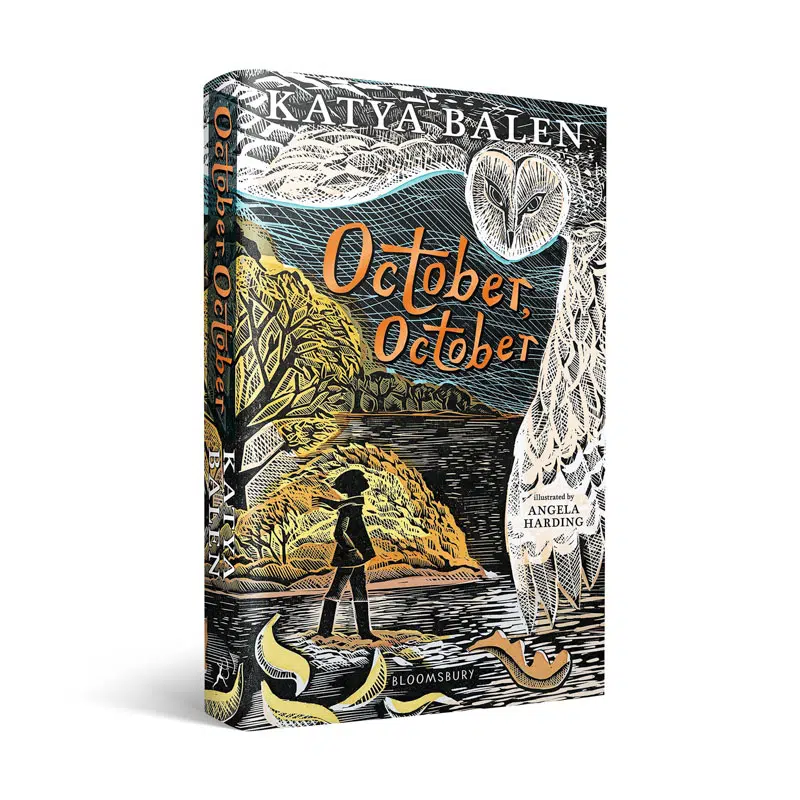In recent months, shortly after the beginning of a new semester at school, the Peking University Sixth Hospital Children’s Department (also known as Peking University Institute of Mental Health) has been flooded with young patients. According to reports Sanlian Life Weekly, more than 300 children suffering from mental depression visit the hospital daily. This issue has become of great concern to society. There are a number of ways to address mental health problems, such as exploring interests like sports, music, art, or connecting with nature. The world of reading can play a major role as a significant positive influence on teenagers’ mental health.
Let’s dive into the benefits of reading. We will investigate the impact of good reading habits on an individual’s mental well-being. We will also hopefully inspire satisfactory reading habits.
Based on this topic, I would like to recommend three books to our young readers: October, October, by Katya Balen; Goldfish Boy, by Lisa Thompson; and Going Solo, by Roald Dahl.
Stay tuned for my three-part series on mental health book recommendations from one young person to another.
 October, October – Katya Balen
October, October – Katya Balen
“We live in the woods and we are wild” – this phrase oversees the theme of the book October, October by Katya Balen. This wondrous book (Yoto Carnegie Award winner and UKLA Book Award winner) captures the audacity and the golden, shining moments of youth, the embracing love of families, and the unique beauty of nature.
The story revolves around the journey of October, a young, bold, and curious girl who lives in the woods with her father. She cherishes microscopic details in her life, such as helping her dad load wood to heat the house, observing the natural life cycle in the woods around her, spending nights by the fireplace and being buried in the fantasy of her books, or simply picking up stones and marbles, collecting them in her very own “treasure box.” To October, these rocks each tell her a story when she feels their different surfaces and texture. She spends most of her free time playing with wild animals and building her own secret shelter in the forest. Life is peaceful and undisturbed until a terrible accident falls upon her father, shattering October’s harmony like a thundering tractor amid a serene forest.

October has hardly ever lived with her distant mom, who is always buried in her work. When October was young, her mother relocated to the city to pursue her job. October is often upset and furious about this; to her, her mom left the family behind. As a result, when her mother occasionally comes to visit, October climbs up the tallest tree in the forest to avoid her own raw nerves.
However, on October’s extraordinary 11th birthday, her long-forgotten mother comes to their house, bringing a present and looking tremendously different. The image of her triggers uncomfortable shivers and memories inside of October. All of this is too much and happening too fast. October has no choice but to run from her worries. Utter discomfort and long-buried trouble reforms into energy, allowing October to climb higher than ever before up that tree – “I was a mountaineer,” she claims. All October can notice while recklessly dashing up the tree is her dad desperately following her and shouting her name. Suddenly, the feeble sound of snapping twigs breaks the still air filled only with faded shouts and consistent panting…
The next thing October sees is her father lying in a crumbled heap under the enormous tree.
Shortly afterward, October is in a daze while she watches her dad being carried away in an ambulance. It is not until hours later that she realizes she is alone with “the woman who was [her]mother.” It hits her that she has harmed her beloved dad on her birthday.
Later in the book, October has no choice but to live with the distant “woman who was [her]mother,” moving to the vastly different city. Unlike most children here in Beijing, who are sociable and familiar with living in a busy, metropolitan city, October is astounded when she arrives in an entirely different environment. Having lived in the private woods for all her life, she is completely new to the contrasting customs in the city or seeing that many people. At the same time, she does not have her one trusted family member with her; she has only the woman she loathes. October has entered what seems like a forest made of steel and concrete, devoured by population, and filled with tall, looming buildings – “Instead of the sky there are buildings, and instead of trees there are buildings, and instead of birds there are buildings.”
Nevertheless, October makes it through experiencing the first time at school (she was homeschooled before), living in a modern apartment in a new room, using entirely new technology, and interacting with her mom every day. Every vehicle October sees in the city reminds her of the old Land Rover she and her dad would use to pick up groceries, every bird prompts her to think of the boundless freedom in the woods, and every breath she takes, sharp with the sickening pains of guilt and sorrow, draws her mind to her dad lying powerlessly in the hospital because of her.

The values of resilience, courage, hard work, and love are woven throughout the book. We can explore traces of resilience and courage when October faces her dark, nerve-wracking secret in the midst of deep uncertainty. Moreover, October tries with all her might to apologize to her dad. She waits a long time to find the right opportunity, hunting for the perfect present. Throughout her interactions with him, she consistently hesitates out of anxiety and nervousness – uncertain and afraid. Ultimately, October summons every ounce of courage, confronting her dad and “making things right.”
We can see several details in which October tries to express her sorrowful emotions. When living with her mom in London, she walks along the banks of the River Thames and resumes her usual hobby: collecting stones and treasure. October ends up making some friends from this unique activity. Additionally, because October enjoys reading, she has an overflowing imagination and creativity. This helps her make a flawless present for her dad. At the same time, the stories in her reading help her overcome the many challenges she faces. Most importantly, October’s life in the wild and her perspective as an impotent viewer of the remarkable natural ecosystem develope her resilience as a person.
Because of October’s plentiful time living with her mom while her dad is in hospital, their relationship grows much more potent. October feels the long-lost warmth under motherly care, and the family is once again reunited. The love expressed in the plot is not limited to their family, but is also shown through October’s love for nature.
This book draws readers of all ages into October’s compelling and touching world. From October’s unique perspective, we can see vivid events, times of hardship, and daily life in a natural and untamed empire.
As young readers, we can be greatly inspired by October’s impressive example. We understand the importance of courage when facing a completely different environment, and we celebrate persistence by understanding that, ultimately, our imperfect path shall determine our very own stories. However unlike our lifestyles, personalities, or additional circumstances may be, October teaches us how to express our emotions and find our own balance. From October’s story, we can learn to confront our social fears and challenge ourselves outside our “comfort zone” or “friendship circle” or whatever may be limiting us from taking risks and learning new things. I found October, October to be full of inspiration. Balen’s poetic style and October’s fascinating character make the book a must-read.
Check back next Monday as we look at Goldfish Boy by Lisa Thompson.

Do you have a great book that you just NEED to recommend to others? Let us know! Contact minayan@beijing-kids.com to share your favorite reads.
Images: Amazon, Bing, Pexels




